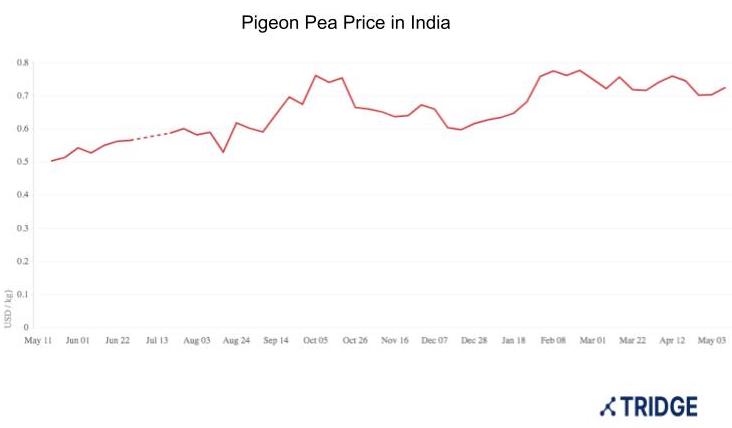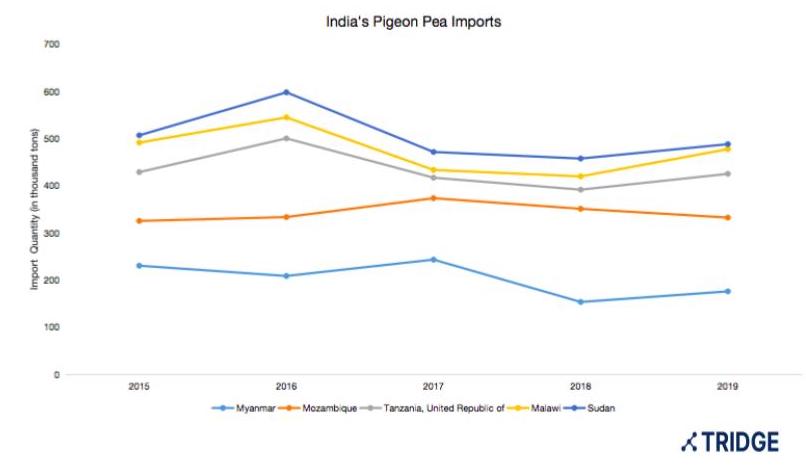India opens up imports of Pigeon Pea (Tur), Green Gram (Moong), and Black Gram (Udad)
Given a large share of the vegetarian population in India, pulses are an integral part of the Indian diet, providing much-needed protein to the carbohydrate-rich diet. India is the largest producer of pulses in the world and produces a variety of pulses like chickpea (gram), pigeon pea (tur), green gram (moong), black gram (urad), and lentils, among others. Despite being the largest producer, India remains a net importer of pulses like pigeon pea, green gram, and black gram due to high domestic demand. On 15th May 2021, after three years, India has opened free imports of pigeon pea, green gram, and black gram and shifted these three commodities from restricted to open category. The policy will be in effect till 31st October 2021, which means all bill dates should be till 31st October 2021 or before.
Shortage of Pulses in India
Domestic production for pulses was affected by high, unseasonal, and erratic rains between June and October 2020. The summer crop (June to October) of pigeon peas was 19.5% less than the expectations. The government projected 4.8 million tonnes of pigeon peas by the end of October; however, only 3.8 million tons were harvested. The rains have impacted the quantity and quality of the pulses available in the market. Further, the government buffer stocks in the country have reduced significantly after the food aid programs held during the nationwide lockdown in 2020 due to the COVID-19 pandemic. According to Nidhi Kumari, Engagement Manager at Tridge, the decision to import these pulses has been made due to the shortage in the domestic market and the upward trend in domestic prices of these pulses.

Source: Tridge. Price Charts.
Trade Opportunities Under Free Import Policy
Prior to 15th May 2021, the import of pigeon pea (tur), green gram (moong), black gram (urad) was restricted under quantitative trade barriers, and only a limited quantity was allowed to import. Under the “Open General License,” a free import policy will enable the traders to quickly import the required quantity of pulses to fulfill the shortage in the domestic market. In the past, India has imported pulses from Myanmar to fulfill the domestic demand. However, in the last few months, Myanmar has shown signs of uncertainty in the availability of pulses due to political instability. In general, international buyers have reduced their pulse stocks and funds in Myanmar, signed fewer new contracts, and offered less attractive terms.
Given the limited domestic supply and Myanmar’s political situation, India is likely to import pulses from Africa countries like Mozambique, Tanzania, Malawi, and Ethiopia in East Africa. These countries are popular for premium quality and competitively priced pulses like Pigeon peas, green gram, kidney beans, and chickpeas. Pigeon peas are mainly exported from Tanzania, Mozambique, Malawi, and green gram exports dominated by Kenya, Tanzania, and Mozambique. They have experience exporting pulses to India, and the traditional farmers in these countries have invested in increasing their acreage and yields. Even though these countries are far from India with higher freight costs, the imports are expected to be profitable to the importers under the free import policy.

Source: ITC. Trade Map. HS Code: 071360
Sources
- ITC. Trade Map. HS Code: 071360
- New India Life. “India changes pulses imports from restricted to open category after 3 years."
- Tridge. Local Insights. "Myanmar pulses sector decreases in production and price."
- Tridge. Price Charts.





